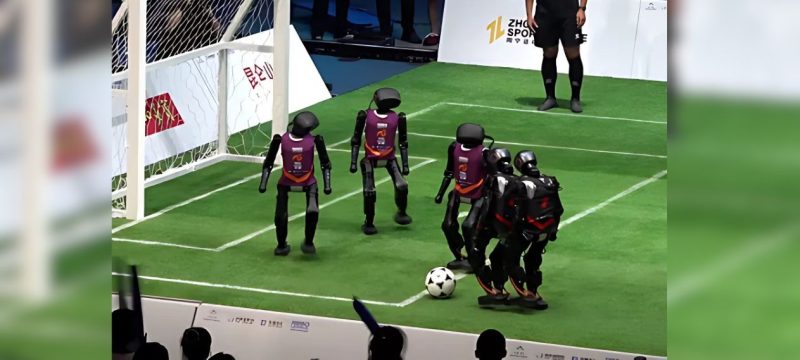In a groundbreaking technological showcase, China has conducted the world’s first football match played entirely by AI-powered humanoid robots, with no human control involved.
The historic game took place in Beijing on June 28 and was hailed as a major step forward in autonomous robotics and intelligent mobility. The robot players operated fully independently, showcasing real-time decision-making and coordination on the field.
Read more: Tesla’s Robotaxi Dream Stumbles As Human Monitors Take the Wheel
Organized by top Chinese academic institutions, the match featured four teams representing three universities, including Tsinghua University and Beijing Information Science and Technology University. Team Vulcan from Tsinghua University emerged as the tournament champion.
As reported by China News Network and later cited by Bloomberg, the match followed a 3-on-3 format with two 10-minute halves. Unlike traditional robot demonstrations, these humanoid players were outfitted with sophisticated vision sensors, allowing them to detect the ball, coordinate with teammates, and move strategically—all without any human intervention.
Wearing black and purple uniforms, the robots impressed the audience with their balance, agility, and ability to make decisions autonomously. Mimicking human behavior, the robots even celebrated goals by raising their fists. Despite their advanced design, some robots stumbled and required assistance from staff to leave the field, adding an unexpected dose of realism to the futuristic match.
Organizers emphasized to the Associated Press that the standout feature of the event was the robots’ complete autonomy, guided solely by built-in algorithms. They described the match as a practical testbed for evaluating machine learning progress, robotics engineering, and autonomous decision-making systems.
The humanoids were designed and built by Booster Robotics, a Beijing-based robotics company. Its CEO, Cheng Hao, highlighted that sports-based simulations like these offer ideal environments for testing the integration of perception, control, and mobility in robotic systems. “Such competitions challenge both the software and the mechanical aspects of robotics,” he stated.
This match also served as a preview for the upcoming World Humanoid Robot Games, scheduled to take place in Beijing later this year. Organizers hope these types of events will encourage closer collaboration between AI researchers and robotics developers, eventually leading to innovations that extend well beyond the sporting world.
While the match didn’t match human games in speed or intensity, experts emphasized that its significance lies in the intelligence and autonomy demonstrated. “The real achievement is not speed but the ability to reason, coordinate, and act independently,” a Chinese official told state media.









